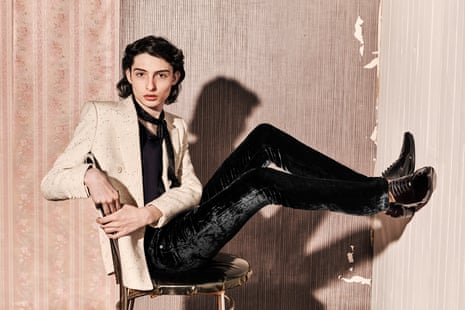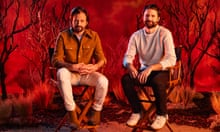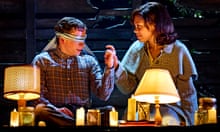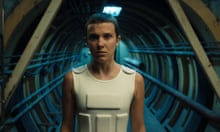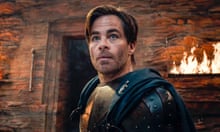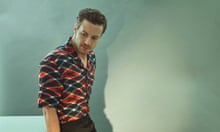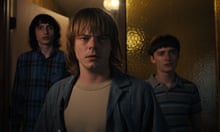Not long into our conversation, the Canadian actor Finn Wolfhard rises from a couch and begins pacing the bright hallways of his parents’ Vancouver home, where he has been waiting out the pandemic. We are talking over Zoom, which he has downloaded on to his phone. And while he walks – while he carries me from one room to the next, describing the roles he’s played, the directors he admires, how he has been occupying himself during this odd time – he holds his phone at chest-height, so all I can do is gaze up at him, at his straight-line features and his long hair – a dark, thick tangle – and beyond him at the ceilings of his parents’ home, which are mostly wood-panelled and whitewashed, like the ceilings of a seaside cottage.
Once he gets up, he never sits down. It’s not that he’s jittery. While he’s usually relentlessly busy with work, a kinetic bundle of oomph, lockdown has forced Wolfhard to accept calm, to embrace the enforced quiet, which he has decided is a good thing. “You feel, like, kind of cleansed,” he says. “You feel 100% yourself.” His therapist, who he has been speaking to remotely, has given the period a name: The Great Pause. “I’ve had to learn how to be bored.”
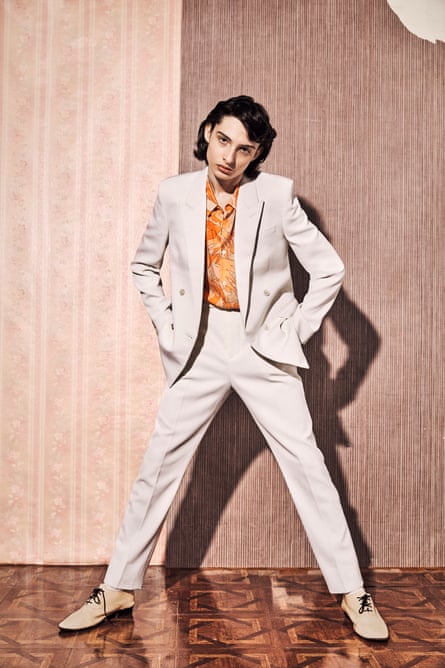
And yet here he is, moving from one side of his parents’ home to the other and back again. Wolfhard describes himself as someone with “so much crazy energy”, even for a 17-year-old – so much that he often feels he must start doing something even when he is already doing something. (Before the pandemic, he thought standing still was a waste of time.) He also describes himself as “a crazy workaholic”, which shows in his output. In the past two years alone he has appeared in several major films: the big-screen adaptation of Donna Tartt’s novel The Goldfinch; the second chapter in the popular It films – as well as the third series of Stranger Things, the hit Netflix show that has made him a star. He auditioned for Stranger Things when he was 12, and he has worked almost nonstop ever since – two films one year, three the next, a remarkable schedule. We were due to discuss his latest project, a big-budget Ghostbusters reboot directed by Jason Reitman. But the film has been postponed, another casualty of the pandemic, and so his publicist suggested we discuss his other interests: not just the acting, but also the fact that he is a screenwriter and a short-film director and the frontman in a bona fide garage-rock band, the Aubreys.
Wolfhard’s professional career began when he landed a role in a music video, aged nine. “You could go on Craigslist and search for gigs,” he remembers. “And some were, like, sketchy, but you would also find, like, ‘Looking for eight- to 11-year-old boy and girl to play younger versions of Canadian indie band.’” He had begun making his own short films as a seven-year-old – “mostly sci-fi rip-offs” – and he had always marvelled at the finished result, rapt by the magic of it, as though it weren’t something he had made himself. For a while he thought he would go to film school and become a director. But his first experience of being an actor on set “totally changed my life”, he says, and his second experience – another music video, this one very high drama (his character shoots a policeman) – confirmed the passion. He fell in love: with being on set, with being part of a group of like-minded people who somehow managed to film a load of independent scenes and make it into a whole. He had seen the filmmaking process up close, “and it was mind-blowing”.
Wolfhard is best known for Stranger Things, in which he plays Mike Wheeler, the de-facto leader of a bunch of kid-nerds who have to investigate the paranormal goings-on in their middle American town while also struggling with regular teenage stuff, like figuring out how to act around members of the opposite sex. Wolfhard plays Wheeler as determined but awkward and gawky, and he is so convincingly awkward and gawky that it is easy to think he would be the same in real life, that the boundary between Wolfhard and Wheeler was somehow blurred, though really the only similarity seems to be that they are both decent kids. On comment boards, fans describe Wolfhard as “wholesome”, almost in defiance of what we worry might happen to a child star: that their heads get turned by bad stuff, that they make poor life choices and develop destructive habits, and that these things are inevitable for them because they have been so directly in the spotlight while so young, and who could handle that kind of pressure?
Apparently Wolfhard can. He doesn’t drink. He doesn’t smoke. He doesn’t do drugs. (Because he failed his test, he doesn’t even drive.) In a recent interview, the actor Ryan Reynolds, who is also from Vancouver, said that friends the pair have in common describe Wolfhard as “disciplined and smart and charming and down to earth”, before asking how he stays so grounded. “If I were in the same boat in, let’s say 1990, I think it would be different,” Wolfhard tells me. “But because there are so many rules to keep children safe now, you know? Ask my co-stars. None of us have ever been in the position where, like, we’re at an uncomfortable party being served drinks… Don’t get me wrong, it happens. It depends on the person. But the environment I’ve grown up in has been very positive.” When I ask him to reveal his worst vice, he responds, “I say the word ‘Like’ a lot,” before adding, “And I eat like shit. I still eat like a four-year-old” – burgers, sweets – “which is not a good thing when you’re constantly travelling and feeling crappy because of your diet.”
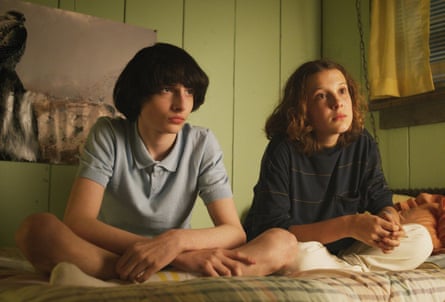
Earlier this year, before the pandemic hit, Wolfhard travelled to Atlanta to film the fourth series of Stranger Things. “It was perfect,” he says. “We were ahead of schedule, which has never happened before, because there’s never a realistic approach to scheduling, and then boom, it just stopped, and everyone had to go home, and everyone’s just so sad…” When the original audition came about, Wolfhard was “sick in bed and almost considering not even acting”. A film he had landed had fallen through, and he’d decided to concentrate on making it as a director. (A brief reminder that he was not yet even a teenager.) But he sent an audition tape anyway, and it was noticed by the show’s directors, the Duffer brothers, and when the three of them eventually spoke, on Skype, “they just kind of pitched me the show – I was, like, 12 – and we talked about all the movies it was based on,” and that was that.
When people ask Wolfhard if he expected Stranger Things to be such a success, he says no, he had not prepared for its resonance, and he had not fully prepared for fame. At the time, Netflix was popular but not quite the beast it is now, and almost everyone on set was new to acting. “We just thought we were filming this secret thing that no one knew about,” he says. “Which we were. No one knew what we were doing. Netflix were kind of hands-off. We thought maybe it would become a cult classic, and we’ll come back to it in 30 years and be really proud of doing it.” Mostly the cast wondered whether or not the show would be renewed for a second series. Wouldn’t it be fun to come back, do it all again? “And then it just blew up. Overnight.”
The success of Stranger Things means Wolfhard is now recognised internationally, and he cannot escape its reach. During a recent trip to Tokyo, he spent four days moving freely through the city before word of his presence got out and the mega-fans descended. The same thing happened in Barcelona – a fleeting moment of freedom, and then, surprise, people everywhere. Wolfhard doesn’t think he’ll ever get used to the attention, but he does accept, wisely – more wisely than many much older actors – that it is a part of his work. “Sure, sometimes it can be off-putting, but I love my job too much to be, like, ‘I’m through getting recognised, I don’t want photos!’” During lockdown, fans have approached him while forgetting the two-metre rule, which hasn’t been fantastic, he says, but which he understands. “It’s like, if the world was ending and you saw Brad Pitt – and I’m not saying I’m Brad Pitt – but you would see him and you’d forget that the world was ending. It’s human. Even me, I’m guilty of it. I see celebrities and get awestruck” – he widens his eyes and pantomimes wonder – “and forget about everything else.”
Given all that Wolfhard has accomplished, it is easy to forget that he is still very young, not yet legally an adult. But Wolfhard has never considered age a barrier. “I was always confused why young people weren’t taken seriously,” he says. “When I was younger I would ask, Why don’t they give big budget action movies to kids? Just give a seven-year-old an unlimited amount of money – do you know how insane that would be? The imagination? It wouldn’t make any sense. It would be completely mad. But you’d see the passion and everyone would love it – everyone would go and see it. I didn’t understand that when I was younger, and I still don’t understand that as a 17-year-old. I mean, I understand, but I’ve always tried to push that boundary, of what I can do at my age.”
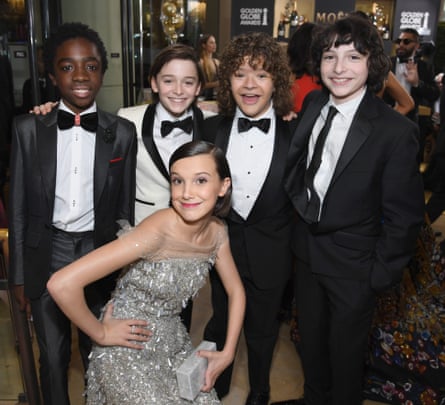
Wolfhard thinks his energy comes from his mother, who was an artist and is now “just a great stay-at-home mum”. His work ethic comes from his father, who trained as a lawyer but for a while was also a screenwriter, signed at some point to the Gersch agency, in LA. (“It literally all comes from my family,” he says of his interests.) When Reynolds asked Wolfhard how he remained so grounded, he pointed to his family. “I have good parents,” he says now. “And I have a great friendship group.” Whenever he is in danger of slipping into “becoming a person who talks about themselves all the time, someone will call me out on that,” he says. “None of my friends are ‘Yes’ people.”
Wolfhard attended a regular school whenever he was in Vancouver. (On set he had a tutor, who, he says: “I’m best friends with and who has taught me so much.”) He was grateful for school – that he could still attend, be a bit normal – but he didn’t enjoy it. “I always felt like everyone was going so much faster than I was,” he says, “and I could never catch up to them.” That he was away a lot didn’t make it any easier. “You know, when I was 12, on set, it opened my eyes. I knew exactly that this is what I wanted to do. I wanted to be a filmmaker. I wanted to be on set 100% of the time and just watch filmmaking happen. And it was hard for me to grasp that I had to leave to go to school, to do the other work. I’m glad I did, but it was hard.”
When I ask if he felt as though he ever missed out on the regular teenage experience he shakes his head. “The normal teenage experience is you go to school and you go to parties once in a while… I’ve never really been into that stuff. What I like doing all the time is the stuff I like to do: movies and music.” In his spare time, he watches films constantly, which is kind of work, because really he is studying them. And when he is not watching movies he is listening to music. “I listen to it on the way to set. I listen to it at school, at home, when I write,” he says. “It’s constantly in my head.”
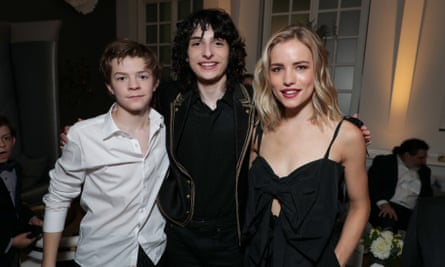
By coincidence more than anything else, many of the films and TV shows Wolfhard has appeared in have been horrors. But he loves comedy. When he was younger he took improv classes, spurred on by his brother, who introduced him to the form. “I used to want to be a director and part of an improv team,” he says, “which was kind of a funny thing to want to do.” Last year, he used a popular crowdfunding site to raise cash for his first short film, Night Shifts, which he hoped would be a drama about divorce but which, inexplicably to Wolfhard, ended up a teen comedy slasher. “I love comedy,” he says. “I’ve tried so hard to write drama and it’s impossible. I can’t do it. But when you have a sad life, a sad situation, there are always funny moments. Some people laugh at funerals. In sad situations there is always room for comedic property.”
When I ask if he notes down these kinds of moments for later use, he interrupts me. “Am I always on? No.” And yet he is aware that material comes out of experience, particularly the experiences he doesn’t enjoy. “When I don’t want to do something, I’ll convince myself I don’t have to do it,” he says. “But one side of my brain will be, like, ‘Oh, but this will be great for your writing.’”
During lockdown, Wolfhard has been working on several other scripts, as well as new music and watching many films. He cannot wait to return to work. And when work does resume, he will fling himself back into all of it – the acting, the music, the writing – and he will keep doing it for as long as he can. “At the end of the road, I want to look back and say I sat in a room with all of my friends and laughed really hard and we all made something together and we did it over and over and over again,” he says. “That’s what I want to do for the rest of my life.”
Stylist Rebecca Grice at Forward Artists; grooming Ruth Fernandez; photographer’s assistant Ros Savoyna; production Stephanie Porto; shot at Milk Studios; set design Cooper Vazques at Frank Reps
